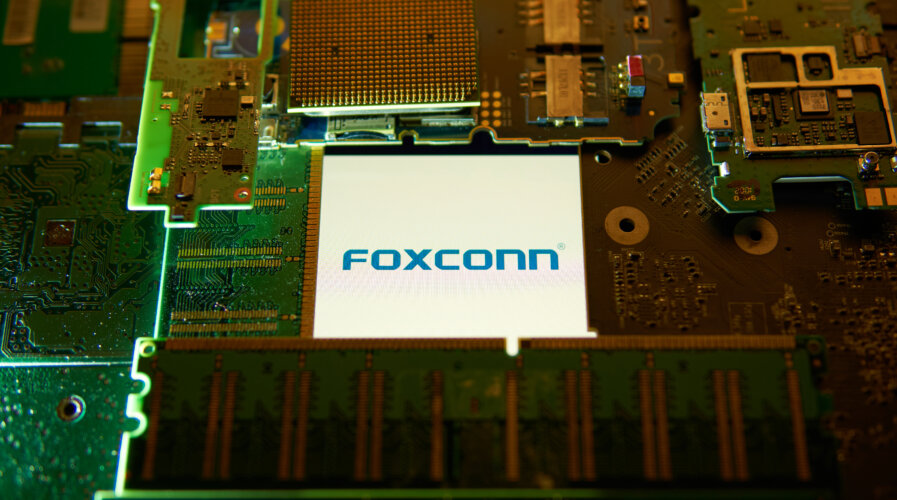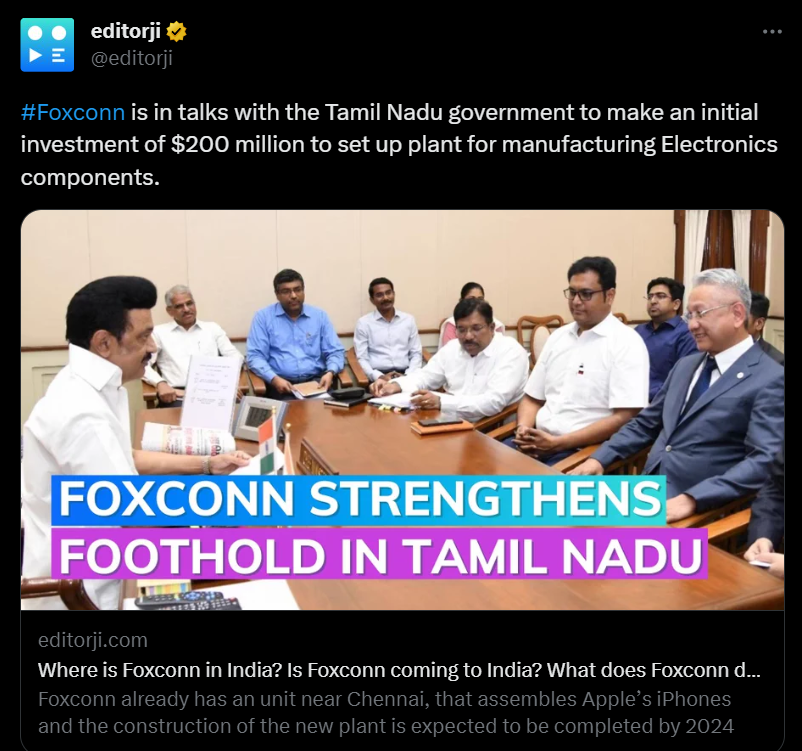
It remains to be seen if the facility would be used for iPhones or other company products. Source: Shutterstock
Is Foxconn considering another factory in Tamil Nadu, India?
|
Getting your Trinity Audio player ready... |
- Foxconn is in talks with the Tamil Nadu government in India
- The company could invest US$200 million in the state’s new plant for electronic components.
- It remains to be seen if the facility would be used for iPhones or other company products.
- The plant is expected to be complete by 2024.
Foxconn, officially Hon Hai Technology Group, is a contract electronics manufacturer primarily known for assembling consumer products like iPhones. But in the last two years, it has stepped up its presence in the semiconductor industry and India as part of its China Plus One strategy. Over the last year alone, the Taiwanese company signed a few agreements to expand its manufacturing presence in the South Asian nation.
But in between, there were downfalls too, the most significant being the fallout of its US$19.5 billion joint venture with Indian metals-to-oil conglomerate Vedanta. The two sides “mutually agreed to part ways,” Foxconn said, highlighting the complication for newcomers entering semiconductor manufacturing.
As Reuters reported this month, deadlocked talks with European chipmaker STMicroelectronics, the project’s technology partner, was one primary reason for the venture’s failure. Foxconn and Vedanta’s effort appeared to rely heavily on STMicro, but once the European company bailed, the joint venture lacked much semiconductor expertise.
Yet, that did not stop Foxconn from charting its way into India. With an existing presence in Tamil Nadu, Chennai, where they currently assemble Apple’s iPhones, Foxconn is looking to expand to the same state by next year. The indication came after Foxconn Industrial Internet (FII) CEO Brand Cheng and other company representatives met with Tamil Nadu officials, including Chief Minister MK Stalin.
According to Reuters, the point of the meeting is to explore investment opportunities in the state. The report stated that the company had presented a plan to invest an initial sum of US$180-200 million in the facility. However, it remains to be seen whether the components produced at this new plant will be utilized for iPhones or other products manufactured by the company.

Foxconn is in talks with the Tamil Nadu government to make an initial investment of $200 million to set up another plant for manufacturing Electronics components in India. Source: Twitter
The Foxconn Industrial Internet makes communication, mobile network, and cloud computing equipment. The proposed plant is scheduled to be completed by 2024, and there are potential plans for further investments, though a final decision has yet to be reached.
Foxconn is also looking at Gujarat, India
While the dissolution of the US$19.5 billion joint venture dealt a blow to the country’s vision of establishing India as a hub for semiconductor manufacturing, Foxconn later expressed its intention to apply for chip incentives in India independently and explore new partnerships.
Just before talks on their second factory in Tamil Nadu came about, Foxconn was negotiating with Gujarat. “We are in touch with multiple prospective investors, including Foxconn… Gujarat is uniquely positioned to attract top chipmakers,” said Vijay Nehra, the secretary of Gujarat’s science and technology department.
Overall, Foxconn made India its second home after China, and within the South Asian nation alone, the company manufactures Apple iPhones with plants in Karnataka and Tamil Nadu. The company even purchased a 300-acre site in Bengaluru and started constructing a US$500 million plant in neighboring Telangana.
“As for labor costs, India also has its advantages. Hon Hai will continue to apply for government incentives to increase its competitiveness,” Foxonn’s Chairman and CEO Young Liu told analysts in May when updating the company’s movies in India. Unlike most other manufacturers, Hon Hai entered India in 2006, ahead of competitors and at a larger scale.
Hence, the company must continue to expand assembly and component operations in India. “We see that more and more suppliers are investing in establishing plants in India and believe that this will become more prominent as time goes on,” Liu noted.
READ MORE
- Safer Automation: How Sophic and Firmus Succeeded in Malaysia with MDEC’s Support
- Privilege granted, not gained: Intelligent authorization for enhanced infrastructure productivity
- Low-Code produces the Proof-of-Possibilities
- New Wearables Enable Staff to Work Faster and Safer
- Experts weigh in on Oracle’s departure from adland


